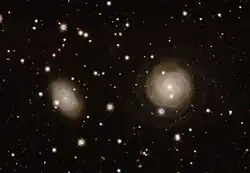NGC 2617
NGC 2617 is a Seyfert galaxy in the equatorial constellation of Hydra. It was discovered on February 12, 1885, by French astronomer Édouard Stephan.[7][8] In 1888, Danish astronomer J. L. E. Dreyer described it as "extremely faint, very small, 2 very faint stars involved".[9] It is located at an estimated distance of 202 million light years.[2] In the infrared, the galaxy has an angular size of 0.693 by 0.652 arcminutes.[5]
| NGC 2617 | |
|---|---|
 legacy surveys image of NGC 2617 (right) and MCG-01-22-027 | |
| Observation data (J2000 epoch) | |
| Constellation | Hydra |
| Right ascension | 08h 35m 38.798s[1] |
| Declination | −04° 05′ 17.90″[1] |
| Heliocentric radial velocity | 4,287 km/s[2] |
| Distance | 201.8 Mly (61.86 Mpc)h−1 0.73[2] |
| Apparent magnitude (V) | 12.66±0.20[3] |
| Apparent magnitude (B) | 14.10±0.30[3] |
| Characteristics | |
| Type | Sc[4][3] |
| Apparent size (V) | 0.693′ × 0.652′[5] (infrared) |
| Other designations | |
| IRAS F08331-0354, 2MASX J08353877-0405172, NGC 2617, MCG −01–22–026[6] | |
This is an almost face-on spiral galaxy with a morphological classification of Sc.[4] In 1992, NGC 2617 was shown to be an extragalactic source of X-ray emission,[10] and in 1996 it was identified as a Seyfert 1.8 galaxy by E. C. Moran and associates.[11] A radio counterpart was found in 1998.[12]
During April 2013, a dramatic outburst was discovered at the core of NGC 2617,[13] and the spectral type was found to have changed to a Seyfert 1. An increase in X-ray emission was observed, followed by an increase in ultraviolet and then infrared luminosity.[4] This event can be modeled by X-ray radiation heating the accretion disk orbiting a supermassive black hole (SMBH) at the center of the galaxy. This was followed by emission at longer wavelengths from the heated disk.[4] An increase in luminosity between 2010 and 2012 may have cleared away dust in the inner part of the disk prior to the outburst, allowing a clearer view and changing the Seyfert type of the galaxy.[14] The SMBH has an estimated mass of 30.9+11.8
−8.5 million M☉.[3]
Additional outbursts were observed from 2016 to 2018, in between deep minima.[15]
References
- Brown, A. G. A.; et al. (Gaia collaboration) (2021). "Gaia Early Data Release 3: Summary of the contents and survey properties". Astronomy & Astrophysics. 649: A1. arXiv:2012.01533. Bibcode:2021A&A...649A...1G. doi:10.1051/0004-6361/202039657. S2CID 227254300. (Erratum: doi:10.1051/0004-6361/202039657e). Gaia EDR3 record for this source at VizieR.
- Crook, Aidan C.; et al. (February 2007), "Groups of Galaxies in the Two Micron All Sky Redshift Survey", The Astrophysical Journal, 655 (2): 790–813, arXiv:astro-ph/0610732, Bibcode:2007ApJ...655..790C, doi:10.1086/510201, S2CID 11672751.
- Robinson, Justin H.; et al. (May 2021), "Tully-Fisher Distances and Dynamical Mass Constraints for 24 Host Galaxies of Reverberation-mapped AGNs", The Astrophysical Journal, 912 (2): 160, arXiv:2103.07000, Bibcode:2021ApJ...912..160R, doi:10.3847/1538-4357/abedaa, S2CID 232223280, 160.
- Shappee, B. J.; et al. (June 2014), "The Man behind the Curtain: X-Rays Drive the UV through NIR Variability in the 2013 Active Galactic Nucleus Outburst in NGC 2617", The Astrophysical Journal, 788 (1): 48, arXiv:1310.2241, Bibcode:2014ApJ...788...48S, doi:10.1088/0004-637X/788/1/48, S2CID 119113433.
{{citation}}: CS1 maint: multiple names: authors list (link) - Skrutskie, Michael F.; et al. (February 1, 2006), "The Two Micron All Sky Survey (2MASS)", The Astronomical Journal, 131 (2): 1163–1183, Bibcode:2006AJ....131.1163S, doi:10.1086/498708, ISSN 0004-6256, S2CID 18913331.
- "NGC 2617", SIMBAD, Centre de données astronomiques de Strasbourg, retrieved 2023-02-24.
- Erdmann, Jr., Robert E. (December 2006), "NGC Discoverer's List", The NGC/IC Project, retrieved 2023-02-26.
- Seligman, Courtney (Aug 25, 2021), "NGC Objects: NGC 2600 - 2649", Celestial Atlas, retrieved 2023-02-26.
- Sulentic, Jack W.; et al. (1973), The Revised New Catalogue of Nonstellar Astronomical Objects, Tucson: University of Arizona Press, Bibcode:1973rncn.book.....S.
- Boller, Th.; et al. (July 1992), "ROSAT all sky survey observations of IRAS galaxies.", Astronomy and Astrophysics, 261: 57–77, Bibcode:1992A&A...261...57B.
- Moran, Edward C.; et al. (October 1996), "Classification of IRAS-selected X-Ray Galaxies in the ROSAT All-Sky Survey", Astrophysical Journal Supplement, 106: 341, Bibcode:1996ApJS..106..341M, doi:10.1086/192341.
- Condon, J. J.; et al. (May 1998), "The NRAO VLA Sky Survey", The Astronomical Journal, 115 (5): 1693–1716, Bibcode:1998AJ....115.1693C, doi:10.1086/300337, S2CID 120464396.
- Shappee, B. J.; et al. (April 2013), "ASAS-SN Discovery of a Strong AGN Outburst and Dramatic Seyfert Type Change in NGC 2617", The Astronomer's Telegram, 5010: 1, Bibcode:2013ATel.5010....1S.
- Oknyansky, V. L.; et al. (May 2017), "The curtain remains open: NGC 2617 continues in a high state", Monthly Notices of the Royal Astronomical Society, 467 (2): 1496–1504, arXiv:1701.05042, Bibcode:2017MNRAS.467.1496O, doi:10.1093/mnras/stx149.
- Oknyansky, V.; et al. (June 2018), "NGC 2617 brightens again after long very low state", The Astronomer's Telegram, 11703: 1, Bibcode:2018ATel11703....1O.
Further reading
- Hoin, S.; et al. (December 2022), "Six Swift Observations of the CLAGN NGC 2617", The Astronomer's Telegram, 15804: 1, Bibcode:2022ATel15804....1H.
- Yang, Jun; et al. (May 2021), "A compact core-jet structure in the changing-look Seyfert NGC 2617", Monthly Notices of the Royal Astronomical Society, 503 (3): 3886–3895, arXiv:2103.04309, Bibcode:2021MNRAS.503.3886Y, doi:10.1093/mnras/stab706.
- Feng, Hai-Cheng; et al. (May 2021), "Velocity-resolved Reverberation Mapping of Changing-look AGN NGC 2617", The Astrophysical Journal, 912 (2): 92, arXiv:2103.03508, Bibcode:2021ApJ...912...92F, doi:10.3847/1538-4357/abefe0, S2CID 232134945, 92.
- "Astronomers track changes around supermassive black hole in the NGC 2617 galaxy", phys.org, Lomonosov Moscow State University, February 22, 2017, retrieved 2023-02-26.
- Giustini, M.; et al. (January 2017), "Direct probe of the inner accretion flow around the supermassive black hole in NGC 2617", Astronomy & Astrophysics, 597: A66, arXiv:1608.00233, Bibcode:2017A&A...597A..66G, doi:10.1051/0004-6361/201628686, S2CID 118783919, A66.
- Jencson, J.; et al. (August 2013), "VLBA Observations of AGN Activity in NGC 2617", The Astronomer's Telegram, 5347: 1, Bibcode:2013ATel.5347....1J.
- Yang, J.; et al. (June 2013), "e-EVN detection of AGN activity in NGC 2617", The Astronomer's Telegram, 5125: 1, Bibcode:2013ATel.5125....1Y.